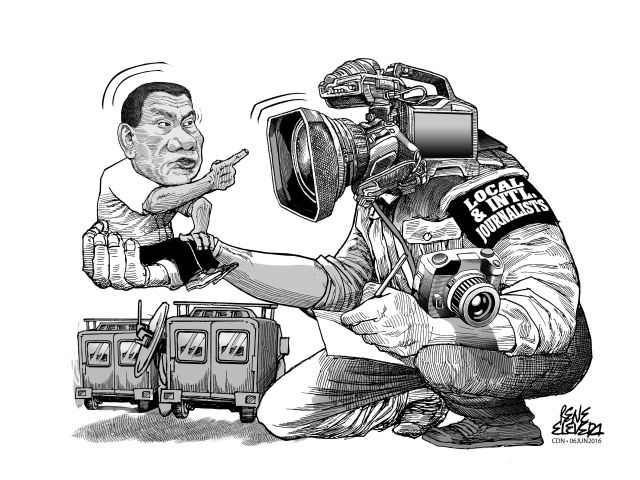
It’s not yet even the honeymoon period—that traditional grace period given by the media and, to some extent, the detractors of any incoming president just as he or she assumes the reins of office and yet President-elect Rodrigo Duterte wasted no time blowing his top and, in his own words, challenging media to either cover or not to cover him.
“Kill journalism in this country,” the president-elect roared as he lashes out at detractors who questioned his statement on the killings of journalists and told the media outside of Davao City not to cover him anymore as he vowed to use the government’s media resources to deliver his message straight to the people.
With the advent of social media, people nowadays can form their own opinions on anything under the sun. As we have seen during the duration of the campaign period, however, social media has become a potent tool for propaganda especially for Duterte’s crack social media team who helped propel his rise to power.
It all started innocently enough with a question on his administration’s policy on the killings of media practitioners that were ignored by his soon-to-be predecessor President Benigno Aquino III.
The president bluntly told the reporter that some media practitioners had it coming because they were corrupt. Duterte said not even the Constitution can protect a journalist from harm especially if he is “a son of a bitch.”
Duterte made reference to erstwhile ally the late Jun Pala, whom he accused of not only being corrupt but also violent as he claimed that Pala barged into a meeting of the Kapisanan ng Mga Brodkaster sa Pilipinas (KBP) with an Armalite rifle in hand, as a prime example of what he described as “vultures of journalism” or the “media lowlifes.”
Amid his rantings of media lowlifes who use the profession “to destroy people” Duterte’s message was emphatic: that the media should not mess with him (he used the “F” word to be specific) and that he’s challenging the media not only to boycott him but to expose the corruption within their ranks.
While media institutions and journalists fume over Duterte’s remarks, there is truth to what he said. “Do not ever think you are in a field of purity…if worse comes to worst, then we’ll expose each other,” Mr. Duterte said.
Still, the hail of insults and invectives spouted in Duterte’s lecture merely reinforces the impression he created, which is justifying the killings of what he perceives to be corrupt journalists that he places on the same level as the criminals that he ordered the police to kill if they resist.
The Cebu Citizens Press Council was right; by encouraging the murder of corrupt journalists, Duterte was not only sticking to “his gospel of death” but violating the oath of office that he will soon take as president, the heart of which is to adhere to the rule of law.